|
After the battles are over,
And the war drums cease to beat,
And no more is heard on the hillside
The sound of hurrying feet,
Full many a noble action,
That was done in the days of strife,
By the soldier is half forgotten,
In the peaceful walks of life.
Just as the tangled grasses,
In summer's warmth and light,
Grow over the graves of the fallen
And hide them away from sight,
So many an act of valor,
And many a deed sublime,
Fades from the mind of the soldier,
O'ergrown by the grass of time.
Not so should they be rewarded,
Those noble deeds of old;
They should live forever and ever,
When the heroes' hearts are cold.
Then rally, ye brave old comrades,
Old veterans, re-unite!
Up root time's tangled grasses--
Live over the march, and the fight.
|
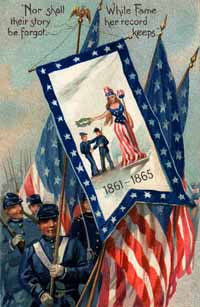
|
|
Let Grant come up from the White House,
And clasp each brother's hand,
First chieftain of the army,
Last chieftain of the land.
Let him rest from a nation's burdens,
And go, in thought, with his men,
Through the fire and smoke of Shiloh,
And save the day again.
This silent hero of battles,
Knew no such word as defeat.
It was left for the rebels learning,
Along with the word retreat.
He was not given to talking,
But he found that guns would preach
In a way that was more convincing
Than fine and flowery speech.
|
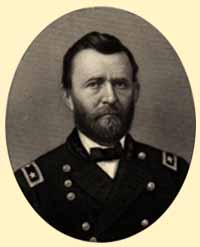
Grant |
|
Three cheers for the grave commander
Of the grand old Tennessee!
Who won the first great battle--
Gained the first great victory.
His motto was always "Conquer,"
"Success" was his countersign,
And "though it took all summer,
He kept fighting upon "that line."
Let Sherman, the stern old General,
Respond to the reveille,
Let him march with his boys through Georgia,
From "Atlanta down to the sea."
Oh, that grand old tramp to Savannah!
Three hundred miles to the coast!
It will live in the heart of the Nation,
Forever its pride and boast.
|
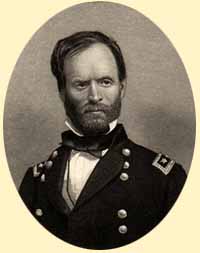
Sherman |
|
As Sheridan went to the battle,
When a score of miles away,
*He has come to the feast and banquet,
By the iron horse to-day.
Its space is not much swifter
Than the pace of that famous steed
That bore him down to the contest
And saved the day by his speed.
Then go over the ground to-day, boys,
Tread each remembered spot.
It will be a gleesome journey,
On the swift-shed feet of thought;
You can fight a bloodless battle,
You can skirmish along the route,
But it's not worth while to forage,
There are rations enough without.
Don't start if you hear the cannon;
It is not the sound of doom,
It does not call to the contest--
To the battle's smoke and gloom.
"Let us have Peace," was spoken,
And lo! peace ruled again;
And now the nation is shouting,
Through the cannon's voice, "Amen."
Oh, boys, who besieged old Vicksburg,
Can time e'er wash away
The triumph of her surrender,
Nine years ago to-day?
Can you ever forget the moment,
When you saw that flag of white,
That told how the grim old city,
Had fallen in her might?
|
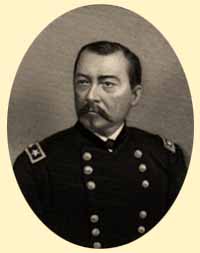
Sheridan |
|
Ah, 'twas a bold, brave army,
When the boys with a right good will,
Went gayly marching and singing
To the fight at Champion Hill.
They met with a warm reception,
But the soul of "Old John Brown"
Was abroad on that field of battle,
And our flag did NOT go down. |
|
|
Come, heroes of Look Out Mountain,
Of Corinth and Donelson,
Of Kenesaw and Atlanta,
And tell how the day was won!
Hush! bow the head for a moment--
There are those who cannot come.
No bugle call can arouse them--
No sound of fife, or drum.
McPherson fell in the battle,
When its waves were surging high,
Brave Ransom sank by the wayside;
'Twas a lonely death to die.
They walk God's fair, green meadows,
They dwell in a land of bliss,
Yet I think their spirits are with us
In such an hour as this.
Oh, boys who died for the country,
Oh, dear and sainted dead!
What can we say about you
That has not once been said?
Whether you fell in the contest,
Struck down by shot and shell,
Or pined 'neath the hand of sickness,
Or starved in the prison cell--
We know that you died for Freedom,
To save our land from shame,
To rescue a periled Nation,
And we give you deathless fame.
'Twas the cause of Truth and Justice
That you fought and perished for,
And we say it, oh, so gently,
"Our boys who died in the war."
Saviours of our Republic,
Heroes who wore the blue,
We owe the peace that surrounds us--
And our Nation's strength, to you.
We owe it to you that our banner,
The fairest flag in the world
Is to-day unstained, unsullied,
On the summer air unfurled.
|
 |
|
We look on its stripes and spangles,
And our hearts are filled the while
With love for the brave commanders,
And the boys of the rank and file.
The grandest deeds of valor,
Were never written out,
The noblest acts of virtue,
The world knows nothing about.
|
|
|
And many a private soldier,
Who walks his humble way,
With no sounding name or title,
Unknown to the world to-day,
In the eyes of God is a hero;
All such he will reward,
No deed however secret,
Is hidden from the Lord.
Brave men of a mighty army,
We extend you friendships hand!
I speak for the "Loyal Women,"
Those pillars of our land.
We wish you a hearty welcome,
We are proud that you gather here
To talk of old times together
On this brightest day in the year.
And if peace, whose snow white pinions,
Brood over our land to-day,
Should ever again go from us,
(God grant she may ever stay).
Should our Nation call in her peril
For "Six hundred thousand more,"
The loyal women would hear her;
And send you out as before.
We would bring out the treasured knapsack.
We would take the sword from the wall,
And hushing our own heart's pleadings,
Hear only the country's call.
For next to our God, is our Nation:
And we cherish the honored name,
Of the bravest of all brave armies
Who fought for that Nation's fame.
|
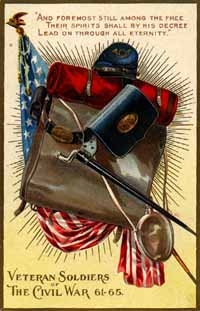 |









